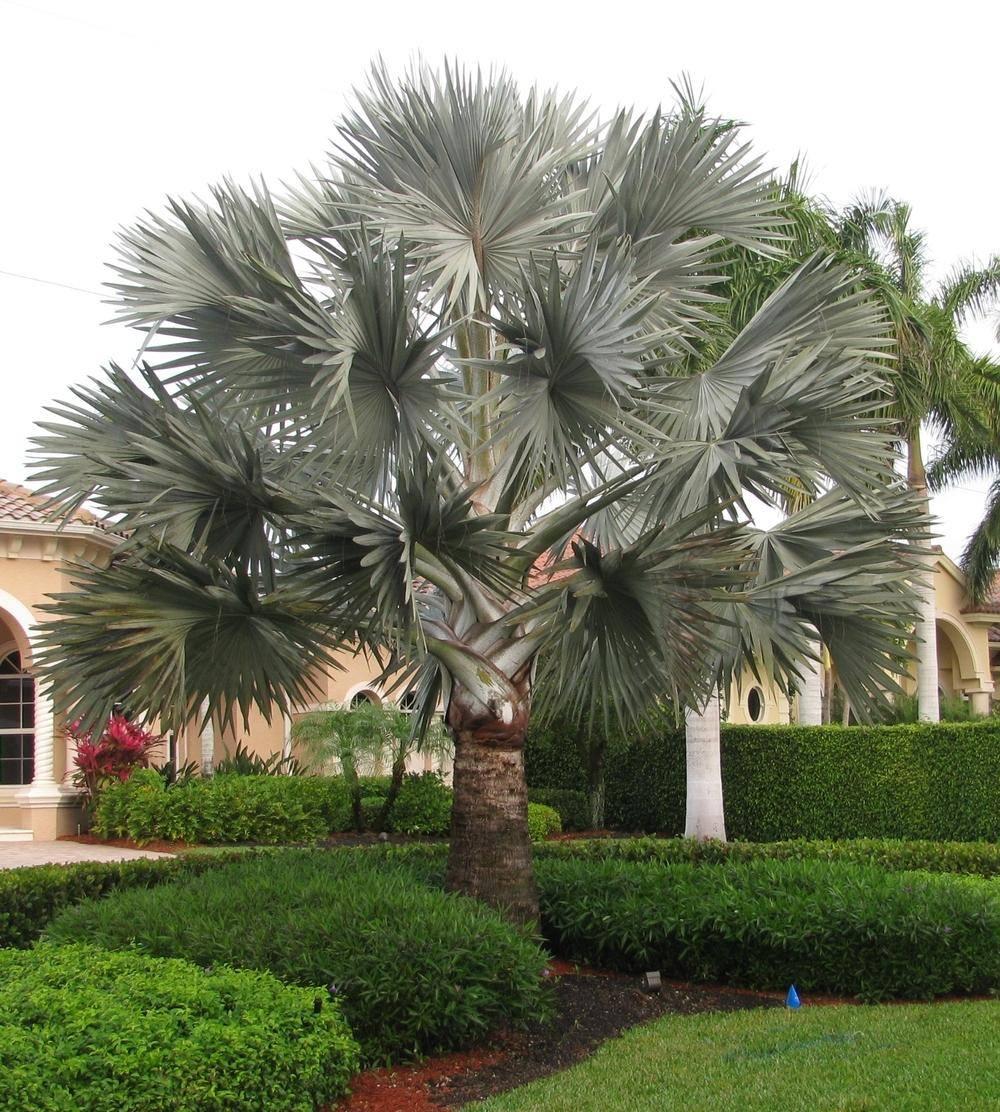Bismarckia Palm “🌴🌟 The Royal Silvery Sentinel
The Bismarckia Palm, named after the German Chancellor Otto von Bismarck, is an architectural masterpiece in any garden. Native to Madagascar, this fan palm is prized for its stunning silver-blue foliage, massive trunk, and slow, steady growth. Bismarckia is often used as a centerpiece in large landscapes, lining driveways, or enhancing tropical themes.
Though grand in appearance, Bismarckia is surprisingly tough, drought-resistant, and relatively easy to maintain once established.
🌿 General Description
Botanical name: Bismarckia nobilis
Common name: Bismarck Palm
Plant type: Evergreen, single-trunk fan palm
Height: 30–50 feet (can exceed 60 ft in ideal conditions)
Spread: 12–16 feet wide crown
Trunk: Thick, gray, ringed, and straight with a slightly swollen base
Leaves: Huge, stiff, fan-shaped leaves (up to 10 feet wide), usually silvery-blue; a green form also exists but is rarer
Growth rate: Moderate (faster with heat and regular watering)
☀️ Light and Temperature Requirements
Sunlight:
Thrives in full sun
Requires at least 6–8 hours of direct sunlight daily
Best color develops in open, sunny areas
Temperature:
Ideal range: 25–38°C (77–100°F)
Hardy to about -3°C (27°F) when mature
USDA Zones: 10–11 (can survive Zone 9b with protection)
⚠️ Young palms are more frost-sensitive. Use coverings or bring into a greenhouse in cold snaps.
💧 Watering Routine
Bismarckia is drought-tolerant once established but appreciates regular watering when young.
Newly planted palms:
Water 2–3 times a week during the first year
Keep the soil moist but never soggy
Established palms:
Water once every 7–10 days, especially in hot weather
Deep soak less frequently rather than shallow daily watering
🛑 Avoid overwatering—Bismarckia does not like wet feet, especially in clay soils.
🌱 Soil and Fertilizer Requirements
Soil:
Prefers well-draining sandy or loamy soil
Tolerates slightly alkaline or acidic soil
Avoid planting in heavy clay without amending with sand or grit
Fertilizer:
Feed 3–4 times a year during the growing season (spring to early autumn)
Use a slow-release palm fertilizer (8-2-12 + micronutrients)
Supplement with magnesium and manganese if yellowing occurs
🌿 Nutritional deficiencies show up as yellowing or necrotic tips—correct quickly for strong fronds.
✂️ Pruning and Maintenance
Low maintenance
Prune only dead, brown fronds—never cut green ones
Self-cleaning in mature stages (fronds fall naturally)
No need to “hurricane cut” (removing healthy lower fronds), as this weakens the plant
🪴 Keep area around base clean to avoid pest hiding spots.
🌿 Propagation
By Seed (only method):
Fresh seeds germinate in 8–12 weeks in warm, moist conditions
Soak seeds for 24–48 hours before planting
Germination best at 30–35°C (86–95°F)
No pups or offshoots: Bismarckia is a solitary-trunk palm
🌱 Seedlings take several years to form a trunk—be patient!
🐛 Pests and Diseases
Generally pest- and disease-free, but may occasionally face:
Palm leaf skeletonizer (chews leaves)
Manganese deficiency (frizzle top)
Ganoderma butt rot (incurable fungal disease affecting roots)
🛡️ Prevention is best:
Use sterile tools
Apply micronutrient sprays if leaf frizzing is observed
Never overwater
🌴 Landscape and Garden Use
Bismarckia makes a bold, architectural statement:
Best planted alone as a focal point in lawns, entrances, or medians
Space at least 10–12 feet away from structures due to crown spread
Suitable for tropical, Mediterranean, or desert landscapes
Avoid planting under power lines or in small yards
🌞 Contrasts beautifully with red and green foliage plants like Crotons, Ixora, or Bougainvillea
✅ Conclusion
The Bismarckia Palm is one of the most aesthetically powerful and low-maintenance palms you can grow. Its silver-blue fans, dramatic silhouette, and rugged drought-tolerance make it perfect for luxurious landscapes, large gardens, and resort-style designs. With enough space, sunlight, and time, it becomes a living sculpture—a regal presence that’s both resilient and refined.
“





Reviews
There are no reviews yet.